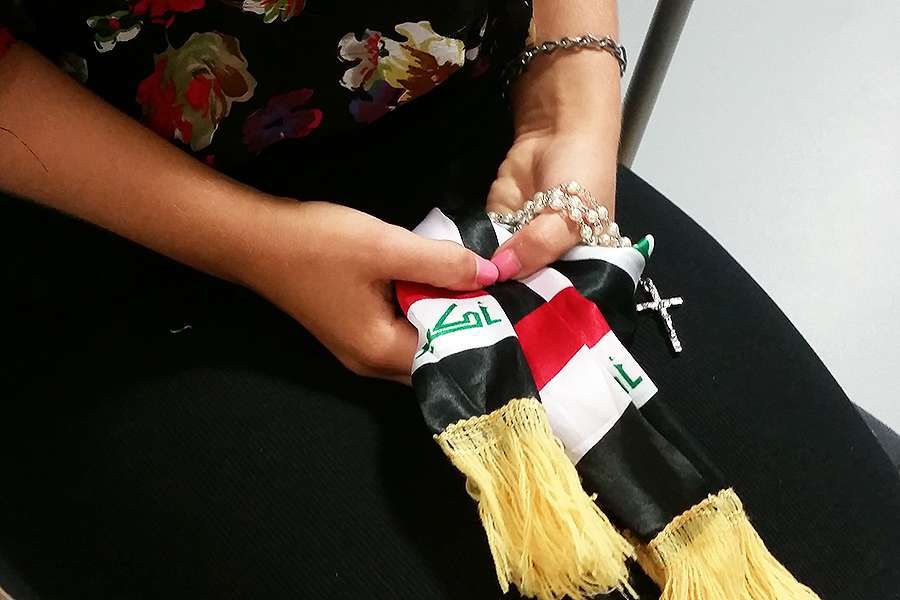A recent trip to Iraq drove home the perilous state of Christians and Yazidis there, a former US Congressman from Virginia has recounted in a new report. “If nothing is done, I believe that we will see the end of ancient Christianity in Iraq within a few years,” former Congressman Frank R. Wolf has said in a report from the 21st Century Wilberforce Initiative.
“Currently, the population is getting dangerously close to dipping below the critical mass needed for these Christians to maintain their long-term presence in their ancestral homeland,” he said. “If this trend is allowed to continue, the Christian population will follow that of the Jewish population, which has decreased from 150,000 individuals in 1948 to just 10 people today.”
While there are signs of hope, such as the return of 600 families to the Plains of Nineveh, Wolf said “bold action” is required by the U.S. and the West to address the situation. The loss of Christianity in the region would further destabilize the Middle East and threaten U.S. national security, he warned.
In March 2016 the U.S. Congress passed a resolution recognizing the acts of the Islamic State group against Christians, Yazidis, and other minorities as genocide, crimes against humanity, and war crimes. “In 2003, the Christians in Iraq numbered 1.5 million,” Wolf said. “Today, that number has decreased to what most estimate is 250,000, although some argue the number is down to 150,000.”
The former Congressman, a Virginia Republican, in August had traveled to Iraq with a delegation including Christian Solidarity Worldwide to examine the situation facing Christians and Yazidis. Concerns are growing that many minority communities will be unable to return home because of the destruction. There are also growing tensions among the Iraqi government, the Kurdistan Regional Government, and non-state actors over the territories that are home to Christians.
The Christian communities doubt their security can be guaranteed. Both Arabs and Kurds have marginalized their communities in the past. The Islamic State group destroyed many biblical and Christian sites, including the town of Nimrod, Wolf said. Every single cross on the churches of Mosul was broken.
He cited the role of Iraq in the Bible as the home of the Patriarch Abraham, Rebecca, and Jacob’s sons. The Prophet Daniel lived there for most of his life. “Despite this, the Christian community in Iraq has been largely forgotten by many in the West,” said Wolf. The former congressman’s report recounted his delegation’s conversations with several Christians.
A Christian family who had fled from their town of Bartella, near Mosul, now living as internally displaced persons in a camp near Duhok, was split on whether to return home. The father said that Christians are peaceful and willing to forgive. His wife said she wanted to leave for Australia or elsewhere “for the sake of my children.” She was so concerned for the safety of her 15-year-old daughter that she had kept her out of school since the family was displaced.
Another Christian, a doctoral student who fled Islamic State militants when they captured Mosul, said he would like to return home but does not trust many of his neighbors. They considered him and his families to be infidels even before the militants arrived. “We have no guarantees. Everyone is using us - we are caught in the middle. We asked for peace, but we cannot live with the discrimination,” he said, according to Wolf.
Then there was the case of a Christian woman he called Maryam. She was sold as a sex slave over 20 times, raped hundreds of times, and otherwise beaten and abused. In an escape attempt, she jumped out of a third story window and broke her leg. When she was finally rescued, her family and community shunned her due to the practices of an “honor culture.” “Now she is afraid to walk on the street in her own community,” Wolf said.
The delegation also met with a young boy and his disabled mother whom Islamic State fighters threatened with death if they did not convert to Islam. They pretended to convert in order to survive, but then the boy was then forced to join the Islamic State. Though he and his disabled mother were able to escape, they cannot return home because they will not be trusted.
Similar stories resulted when the delegation also visited the Yazidi people, an ethnic and religious group with about 600,000 members in Iraq out of 1 million worldwide. Under Islamic State militants, the Yazidis suffered mass murder, rape, enslavement, displacement, and the destruction of their homeland. About 3,000 Yazidi women and girls are still in Islamic State captivity. Few of those who fled their homes have returned, due to the security situation.
A potential offensive against Islamic State could send fleeing militants through their homeland. Some Yazidi women and young girls are committing suicide after victimization by Islamic State. Many lack proper care and also suffer the effects of an honor culture that estranges them from their families, reduces their marriage prospects, and sees psychological treatment as taboo.
Wolf offered several policy recommendations. He said the Senate should pass the Iraq and Syria Genocide Accountability Act, which authorizes and directs the State Department and the U.S. Agency for International Development to provide funds for humanitarian aid to religious and ethnic minorities affected by war crimes and genocide. It also authorizes support for criminal investigations in Iraq of Islamic State members and perpetrators of war crimes.
He called for a fresh assessment of the situation in Iraq and for an international coalition to secure the Nineveh Plains, possibly including a U.S. base or a joint-training base. He suggested that security restrictions on embassy and consular employees limit their ability to learn about local Iraqis which hinders their own policy judgement. Local contractors, then, should move freely throughout the region to survey the situation and develop a better strategy.
Wolf advocated pressure on the Kurdistan Regional Government to implement reforms to provide equal citizenship, security, and economic opportunities for ethnic and religious minorities. He charged that Iran has “imperial ambitions” in the area and could “become a direct threat to Israel and to US regional interests and national security”, as well as inciting Sunni-Shia sectarian violence.
He stressed the need for unity among Christians, Yazidis, and other minority groups, which are now fragmented by their alliances with the Iraqi government or with Iraqi Kurdistan. The diaspora of these communities also must be united, said the former congressman.

